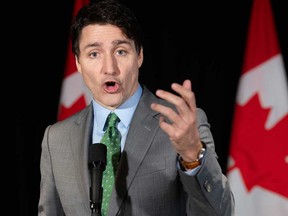
Article content
A report released by the Canadian Climate Institute last week was useful in explaining that the Trudeau government’s carbon tax is only the tip of the iceberg when it comes to the true costs to Canadians of reducing industrial greenhouse gas emissions linked to climate change.
Advertisement 2
Article content
In fact, the CCI says, the carbon tax (aka the federal fuel charge) aimed at consumers is a relatively minor part of this effort, accounting for a mere 8% to 14% of reducing emissions to the federal target of 40% below 2005 levels by 2030.
Article content
The largest contributor, the CCI predicts, will be the output-based pricing system, (aka the large emitter trading system) – aimed at big industries – intended to account for 20% to 48% of emission reductions in 2030.
That’s followed by the government’s oil and gas emissions cap (7% to 34%), methane regulations (1% to 21%), the fuel charge (8% to 14%), waste methane capture (7%), clean fuel regulations (0% to 4%), investment tax credits (2% to 3%) and electric vehicle standards (2% to 3%).
Article content
Advertisement 3
Article content
If it all works, the CCI predicts, Canada’s emissions (670 million tonnes in 2021, the latest available federal government data) will narrowly miss the government’s 2030 target of 440 million tonnes by 27 million tonnes.
Recommended from Editorial
-

GOLDSTEIN: Liberal defence of their carbon tax divorced from reality
-

GOLDSTEIN: PM’s electric vehicle mandates powered by fantasies, report says
-

GOLDSTEIN: The carbon tax is going up and so are emissions
Of course, that’s a big “if” considering that many government initiatives have been announced but not yet implemented, the Liberals may not be the government after October 2025 and they’ve already started watering down the tax by granting a three-year delay in imposing it on homeowners heating with oil, in an attempt to shore up their cratering public support, particularly in Atlantic Canada.
Advertisement 4
Article content
Basically, Trudeau’s climate plan is an enormous, complicated, economy-wide government program where all the moving parts have to work together simultaneously, presided over by the government that brought you ArriveCan.
The CCI, an independent think tank, receives financial support from Environment Canada and provides periodic updates on the Trudeau government’s climate change program, which it says is already significantly reducing emissions.
That said, last fall the CCI estimated Canada’s emissions in 2022 (which the federal government won’t officially release until April) went up by 2.1% , or 14.2 million tonnes, to 685 million tonnes, compared to 2021.
If accurate, Canada’s emissions in 2022 were 6.3% below 2005 levels, far short of the government’s 40% goal in the coldest and second-largest country on earth, with a relatively small population and a resource-based economy, all of which drive emissions up.
Advertisement 5
Article content
The value of the CCI report is that it provides more information than the Trudeau government about its signature climate policy, preferring to treat Canadians like mushrooms by keeping them in the dark and covering them with manure.
As one example, the Liberal government says it doesn’t know how much its carbon tax is reducing emissions because it doesn’t keep track of the data, since it’s too complicated to separate from other efforts to reduce emissions.
It’s best guess – and it’s a big guess – is that the carbon tax, which in this case means the federal fuel charge to consumers and the output based pricing system, will account for up to one-third of Canada’s emission reductions in 2030.
That means, according to the federal government, at least two-thirds of the cuts have to come from other initiatives that have hidden costs to consumers and will disrupt the economy, none of which have anything similar to the carbon tax rebate on the fuel charge for Canadian households.
Advertisement 6
Article content
The Trudeau government claims the negative impact of its climate change program on the economy will be negligible and promote growth in the long term. Others disagree.
Alberta said last month that the federal cap on oil and gas emissions alone would “have a devastating impact on the economies of Alberta and all of Canada. Analysis from the Conference Board of Canada shows that it would reduce Canada’s GDP by up to $1 trillion between 2030 and 2040 and create up to 151,000 lost jobs across Canada by 2030.”
The Montreal Economic Institute reported in December 2023 that the emissions cap will cost our economy billions of dollars every year and that “each time Ottawa forces the Canadian energy sector to contract, it is foreign producers who win. Ottawa does not have the means to affect global demand, so reducing local supply will only end up exporting jobs and tax revenues.”
Even a minor player in cutting emissions according to the CCI report – government subsidies to establish a domestic electric vehicle battery manufacturing industry – is massively costly to taxpayers.
Article content



